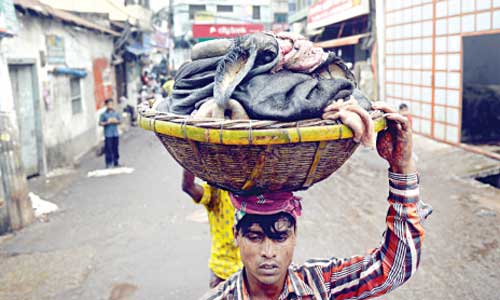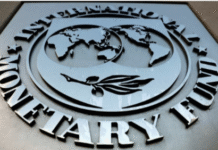Seasonal rawhide traders have faced huge losses in trading of rawhides of sacrificial animals in this Eid-ul-Azha as tanners offered them almost half of the prices at which they (traders) had bought the rawhides.
The traders blamed tanners for their losses while the tanners said that the traders had bought rawhides from people at prices higher than the rate set by the leather sector associations.
A number of seasonal traders in the city’s Posta area, which is one of the main hub of rawhide trading, on Saturday said tanners had offered them almost half of the prices at which they had bought rawhides.
A trader, Jahangir, who brought around 300 rawhides of cows from Narayanganj, was seen roaming from one wholesale shop to another to sell the items.
While talking to reporters he burst into tears and said, ‘Tanners are offering around Tk 800-Tk 1,000 for a cowhide while I bought each of the rawhide at Tk 1,600-Tk 2,000.’
Some other traders also said that they were being offered almost 30-40 per cent less price of the rawhides.
Seasonal traders however, said that like previous years they bought rawhides at a little bit higher prices than the set prices but this year tanners were not allowing any higher prices and most of the seasonal traders failed to sell their items.
A good number of rawhides have been damaged as the seasonal traders failed to sell the items in last two days as tanners offered lower prices.
Tannery sector leaders said though the price of hide was set, but they allowed the prices 10 to 12 per cent higher than that.
The leather sector set the prices of rawhide of sacrificial animals 26-28 per cent lower than the prices set in last year citing fall in prices and slow demand on the international market.
The prices of salted cowhide were set at Tk 50-55 a square feet for Dhaka and Tk 40-45 a square feet for outside of Dhaka. The prices were Tk 20 lower than that of last year.
Brushing aside the allegation raised by seasonal traders, tanners said they refused to buy some of the damaged hides as the items rotted due to lack of processing in time.
Md Shaheen Ahmed, chairman of the Bangladesh Tanners Association, said the supply situation of rawhides was normal in the city and most of the traders followed the buying rate of hide set by the leather sector.
‘It is a common trend that every year tanners have to pay 10 per cent higher than the set-price as seasonal traders collect the rawhides at higher prices,’ he said.
This year the rawhides of sacrificial animals were also being sold at 10 per cent higher than the set-price, Shaheen said.
He hoped that the target of collection would be achieved and 5 per cent of the target had already been collected in last two days.
Md Delwar Hossain, chairman of Bangladesh Hide and Skin Merchants Association, said the rawhides from the Dhaka city had already entered in the tanneries and the hides from outside of Dhaka would start to come to tanneries within one week.
He said that every year some seasonal traders created problems as they collected hides at higher prices and they did not know how to process the items.
‘This year about three per cent of rawhides from Dhaka rotted as seasonal traders kept the items unprocessed for long,’ Delwar said.
Our Barisal correspondent reports:
Retail rawhide and skin traders in Barisal expressed their anger at syndicated trading by big businessmen by setting low prices of rawhides.
At the Chamar Potty area, rawhide and skin trade centre in the Barisal city, the supply of the rawhides in Eid-ul-Azha was 25-30 per cent less than that in the previous year, but the price was 10 to 20 lower than that in last year.
Shahinur Rahman Shahin, secretary of the Barisal Hide and Skin Merchants Association, said the association has 28 members including eight large and 20 small business houses.
‘We have targeted to collect more than 60,000 pieces of cowhides and 13,000 pieces of goat-skins from the region against the
last year’s collection of 40,000 cowhides and 8,000 goat-skins.’
The traders blamed tanners for their losses while the tanners said that the traders had bought rawhides from people at prices higher than the rate set by the leather sector associations.
A number of seasonal traders in the city’s Posta area, which is one of the main hub of rawhide trading, on Saturday said tanners had offered them almost half of the prices at which they had bought rawhides.
A trader, Jahangir, who brought around 300 rawhides of cows from Narayanganj, was seen roaming from one wholesale shop to another to sell the items.
While talking to reporters he burst into tears and said, ‘Tanners are offering around Tk 800-Tk 1,000 for a cowhide while I bought each of the rawhide at Tk 1,600-Tk 2,000.’
Some other traders also said that they were being offered almost 30-40 per cent less price of the rawhides.
Seasonal traders however, said that like previous years they bought rawhides at a little bit higher prices than the set prices but this year tanners were not allowing any higher prices and most of the seasonal traders failed to sell their items.
A good number of rawhides have been damaged as the seasonal traders failed to sell the items in last two days as tanners offered lower prices.
Tannery sector leaders said though the price of hide was set, but they allowed the prices 10 to 12 per cent higher than that.
The leather sector set the prices of rawhide of sacrificial animals 26-28 per cent lower than the prices set in last year citing fall in prices and slow demand on the international market.
The prices of salted cowhide were set at Tk 50-55 a square feet for Dhaka and Tk 40-45 a square feet for outside of Dhaka. The prices were Tk 20 lower than that of last year.
Brushing aside the allegation raised by seasonal traders, tanners said they refused to buy some of the damaged hides as the items rotted due to lack of processing in time.
Md Shaheen Ahmed, chairman of the Bangladesh Tanners Association, said the supply situation of rawhides was normal in the city and most of the traders followed the buying rate of hide set by the leather sector.
‘It is a common trend that every year tanners have to pay 10 per cent higher than the set-price as seasonal traders collect the rawhides at higher prices,’ he said.
This year the rawhides of sacrificial animals were also being sold at 10 per cent higher than the set-price, Shaheen said.
He hoped that the target of collection would be achieved and 5 per cent of the target had already been collected in last two days.
Md Delwar Hossain, chairman of Bangladesh Hide and Skin Merchants Association, said the rawhides from the Dhaka city had already entered in the tanneries and the hides from outside of Dhaka would start to come to tanneries within one week.
He said that every year some seasonal traders created problems as they collected hides at higher prices and they did not know how to process the items.
‘This year about three per cent of rawhides from Dhaka rotted as seasonal traders kept the items unprocessed for long,’ Delwar said.
Our Barisal correspondent reports:
Retail rawhide and skin traders in Barisal expressed their anger at syndicated trading by big businessmen by setting low prices of rawhides.
At the Chamar Potty area, rawhide and skin trade centre in the Barisal city, the supply of the rawhides in Eid-ul-Azha was 25-30 per cent less than that in the previous year, but the price was 10 to 20 lower than that in last year.
Shahinur Rahman Shahin, secretary of the Barisal Hide and Skin Merchants Association, said the association has 28 members including eight large and 20 small business houses.
‘We have targeted to collect more than 60,000 pieces of cowhides and 13,000 pieces of goat-skins from the region against the
last year’s collection of 40,000 cowhides and 8,000 goat-skins.’
Source: New Age










